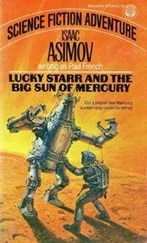Isaac Asimov - All the Troubles of the World
Здесь есть возможность читать онлайн «Isaac Asimov - All the Troubles of the World» весь текст электронной книги совершенно бесплатно (целиком полную версию без сокращений). В некоторых случаях можно слушать аудио, скачать через торрент в формате fb2 и присутствует краткое содержание. Год выпуска: 1958, Издательство: Headline Publications Inc., Жанр: Фантастика и фэнтези, на английском языке. Описание произведения, (предисловие) а так же отзывы посетителей доступны на портале библиотеки ЛибКат.
- Название:All the Troubles of the World
- Автор:
- Издательство:Headline Publications Inc.
- Жанр:
- Год:1958
- ISBN:нет данных
- Рейтинг книги:5 / 5. Голосов: 1
-
Избранное:Добавить в избранное
- Отзывы:
-
Ваша оценка:
- 100
- 1
- 2
- 3
- 4
- 5
All the Troubles of the World: краткое содержание, описание и аннотация
Предлагаем к чтению аннотацию, описание, краткое содержание или предисловие (зависит от того, что написал сам автор книги «All the Troubles of the World»). Если вы не нашли необходимую информацию о книге — напишите в комментариях, мы постараемся отыскать её.
All the Troubles of the World — читать онлайн бесплатно полную книгу (весь текст) целиком
Ниже представлен текст книги, разбитый по страницам. Система сохранения места последней прочитанной страницы, позволяет с удобством читать онлайн бесплатно книгу «All the Troubles of the World», без необходимости каждый раз заново искать на чём Вы остановились. Поставьте закладку, и сможете в любой момент перейти на страницу, на которой закончили чтение.
Интервал:
Закладка:
All the Troubles of the World
by Isaac Asimov
The greatest industry on Earth centered about Multivac—Multivac, the giant computer that had grown in fifty years until its various ramifications had filled Washington, D.C. to the suburbs and had reached out tendrils into every city and town on Earth.
An army of civil servants fed it data constantly and another army correlated and interpreted the answers it gave. A corps of engineers patrolled its interior while mines and factories consumed themselves in keeping its reserve stocks of replacement parts ever complete, ever accurate, ever satisfactory in every way.
Multivac directed Earth’s economy and helped Earth’s science. Most important of all, it was the central clearing house of all known facts about each individual Earthman.
And each day it was part of Multivac’s duties to take the four billion sets of facts about individual human beings that filled its vitals and extrapolate them for an additional day of time. Every Corrections Department on Earth received the data appropriate to its own area of jurisdiction, and the over-all data was presented in one large piece to the Central Board of Corrections in Washington, D.C.
Bernard Gulliman was in the fourth week of his year term as Chairman of the Central Board of Corrections and had grown casual enough to accept the morning report without being frightened by it. As usual, it was a sheaf of papers some six inches thick. He knew by now, he was not expected to read it. (No human could.) Still, it was amusing to glance through it.
There was the usual list of predictable crimes: frauds of all sorts, larcenies, riots, manslaughters, arsons.
He looked for one particular heading and felt a slight shock at finding it there at all, then another one at seeing two entries. Not one, but two. Two first-degree murders. He had not seen two in one day in all his term as Chairman so far.
He punched the knob of the two-way intercom and waited for the smooth face of his co-ordinator to appear on the screen.
“Ali,” said Gulliman. “There are two first-degrees this day. Is there any unusual problem?”
“No, sir.” The dark-complexioned face with its sharp, black eyes seemed restless. “Both cases are quite low probability.”
“I know that,” said Gulliman. “I observed that neither probability is higher than 15 per cent. Just the same, Multivac has a reputation to maintain. It has virtually wiped out crime, and the public judges that by its record on first-degree murder which is, of course, the most spectacular crime.”
Ali Othman nodded. “Yes, sir. I quite realize that.”
“You also realize, I hope,” Gulliman said, “that I don’t want a single consummated case of it during my term. If any other crime slips through, I may allow excuses. If a first-degree murder slips through, I’ll have your hide. Understand?”
“Yes, sir. The complete analyses of the two potential murders are already at the district offices involved. The potential criminals and victims are under observation. I have rechecked the probabilities of consummation and they are already dropping.”
“Very good,” said Gulliman, and broke connection.
He went back to the list with an uneasy feeling that perhaps he had been overpompous.—But then, one had to be firm with these permanent civil-service personnel and make sure they didn’t imagine they were running everything, including the Chairman. Particularly this Othman, who had been working with Multivac since both were considerably younger, and had a proprietary air that could be infuriating.
To Gulliman, this matter of crime was the political chance of a lifetime. So far, no Chairman had passed through his term without a murder taking place somewhere on Earth, some time. The previous Chairman had ended with a record of eight, three more (more, in fact) than under his predecessor.
Now Gulliman intended to have none. He was going to be, he had decided, the first Chairman without any murder at all anywhere on Earth during his term. After that, and the favorable publicity that would result—
He barely skimmed the rest of the report. He estimated that there were at least two thousand cases of prospective wife-beatings listed. Undoubtedly, not all would be stopped in time. Perhaps thirty per cent would be consummated. But the incidence was dropping and consummations were dropping even more quickly.
Multivac had added wife-beating to its list of predictable crimes only some five years earlier and the average man was not yet accustomed to the thought that if he planned to wallop his wife, it would be known in advance. As the conviction percolated through society, woman would first suffer fewer bruises and then, eventually, none.
Some husband-beatings were on the list, too, Gulliman noticed.
Ali Othman closed connections and stared at the screen from which Gulliman’s jowled and balding head had departed. Then he looked across at his assistant, Rafe Leemy and said, “What do we do?”
“Don’t ask me. He’s worried about just a lousy murder or two.”
“It’s an awful chance trying to handle this thing on our own. Still if we tell him, he’ll have a first-class fit. These elective politicians have their skins to think of, so he’s bound to get in our way and make things worse.”
Leemy nodded his head and put a thick lower lip between his teeth. “Trouble is, though, what if we miss out? It would just about be the end of the world, you know.”
“If we miss out, who cares what happens to us? We’ll just be part of the general catastrophe.” Then he said in a more lively manner, “But hell, the probability is only 12.3 per cent. On anything else, except maybe murder, we’d let the probabilities rise a bit before taking any action at all. There could still be spontaneous correction.”
“I wouldn’t count on it,” said Leemy dryly.
“I don’t intend to. I was just pointing the fact out. Still, at this probability, I suggest we confine ourselves to simple observation for the moment. No one could plan a crime like this alone; there must be accomplices.”
“Multivac didn’t name any.”
“I know. Still—” His voice trailed off.
So they stared at the details of the one crime not included on the list handed out to Gulliman; the one crime much worse than first-degree murder; the one crime never before attempted in the history of Multivac; and wondered what to do.
Ben Manners considered himself the happiest sixteen-year-old in Baltimore. This was, perhaps, doubtful. But he was certainly one of the happiest, and one of the most excited.
At least, he was one of the handful admitted to the galleries of the stadium during the swearing in of the eighteen-year-olds. His older brother was going to be sworn in so his parents had applied for spectator’s tickets and they had allowed Ben to do so, too. But when Multivac chose among all the applicants, it was Ben who got the ticket.
Two years later, Ben would be sworn in himself, but watching big brother Michael now was the next best thing.
His parents had dressed him (or supervised the dressing, at any rate) with all care, as representative of the family and sent him off with numerous messages for Michael, who had left days earlier for preliminary physical and neurological examinations.
The stadium was on the outskirts of town and Ben, just bursting with self-importance, was shown to his seat. Below him, now, were rows upon rows of hundreds upon hundreds of eighteen-year-olds (boys to the right, girls to the left), all from the second district of Baltimore. At various times in the year, similar meetings were going on all over the world, but this was Baltimore, this was the important one. Down there (somewhere) was Mike, Ben’s own brother.
Читать дальшеИнтервал:
Закладка:
Похожие книги на «All the Troubles of the World»
Представляем Вашему вниманию похожие книги на «All the Troubles of the World» списком для выбора. Мы отобрали схожую по названию и смыслу литературу в надежде предоставить читателям больше вариантов отыскать новые, интересные, ещё непрочитанные произведения.
Обсуждение, отзывы о книге «All the Troubles of the World» и просто собственные мнения читателей. Оставьте ваши комментарии, напишите, что Вы думаете о произведении, его смысле или главных героях. Укажите что конкретно понравилось, а что нет, и почему Вы так считаете.











